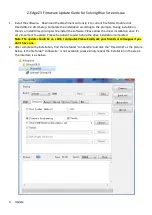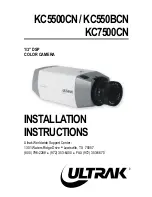
32
3 CH:
This option splits the screen in three
channels.
2 CH:
This option splits the screen in two channels.
A/V SOURCE:
This page determines the video and the audio source.
Choose the channel and the audio/ video numbers
you want to see. Only four channels are available,
each with four video inputs and four video outputs
which you can select from and set; these same four
channels have six audio inputs and two audio outputs
you can select from and set. This "A/V SOURCE"
page lets you set two audio outputs: AUDIO 1 and 2,
which have six microphone sources each which you
can choose from, four from the video cameras and
two from the AUX ( auxiliary ) microphones. You can
only set two microphones to play. Each of the ports,
AUDIO 1 and 2, can play the sound recordings of the
same or different videos simultaneously.
LIVE OUTPUT VOL.:
This item determines the output
volume levels in the live mode. The options range
from "
00
" (mute) to "
10
" (full).
4.2 The ALARM Setting
This menu allows users to program the
configuration of the alarm recording only when an
alarm input is activated. The device will record as
long as the alarm input is activated.
ALM OPERATION:
This option determines whether to
activate/deactivate the alarm recording when it
detects an alarm input.
ON:
The device activates the alarm recording when
it detects an alarm input.
OFF:
The device ignores the alarm signal when it
detects an alarm input.
REC RATE:
This option is for the purpose of adjusting the
number of pictures recorded every second into a
storage disk when an alarm input is activated. For
an NTSC unit, there are 5 different record speeds
you can select from:
30F/S (30 frames per
second), 15F/S, 10F/S, 6F/S,
and
REMAIN.
For a
PAL unit, there are 5 different record speeds you
can select from:
25F/S (25 frames per second),
12.5F/S, 8.3F/S, 5F/S,
and
REMAIN.
If you select
REMAIN
for use,
the device will record images at
the same speed as set on the
REC
page.
REC QUALITY:
This option determines the image quality to be
recorded when an alarm input occurs. There are 4
levels of image quality to choose from:
BEST,
HIGH, STANDARD,
and
BASIC.
The table below
shows the level of image quality with the
corresponding compression ratio and image size.
CH1
CH2
01/01/2006 12:00:00
RECORD
ALARM
CLOCK/ TITLE
COMMUNICATION
DISK
SYSTEM
MAIN MENU
GOTO ALARM PAGE
ALM OPERATION
REC RATE
REC QUALITY
AUDIO
ALM TYPE
ALM DURATION
PRE-ALARM
IO CONNECTION
ALARM SETTING
MAIN PAGE
: OFF
: 15 F/S
: BEST
: OFF
: NO
: 30 SEC
: OFF
: ALARM
CH1
CH2
CH3
01/01/2006 12:00:00
A/V SOURCE
CH1 CH2 CH3 CH4
CAMERA1
CAMERA2 CAMERA3 CAMERA4
AUDIO 1
AUDIO 2
AUX 1
AUX 2
LIVE OUTPUT VOL.
10
< >
MOVE
^
v
CHANGE
















































